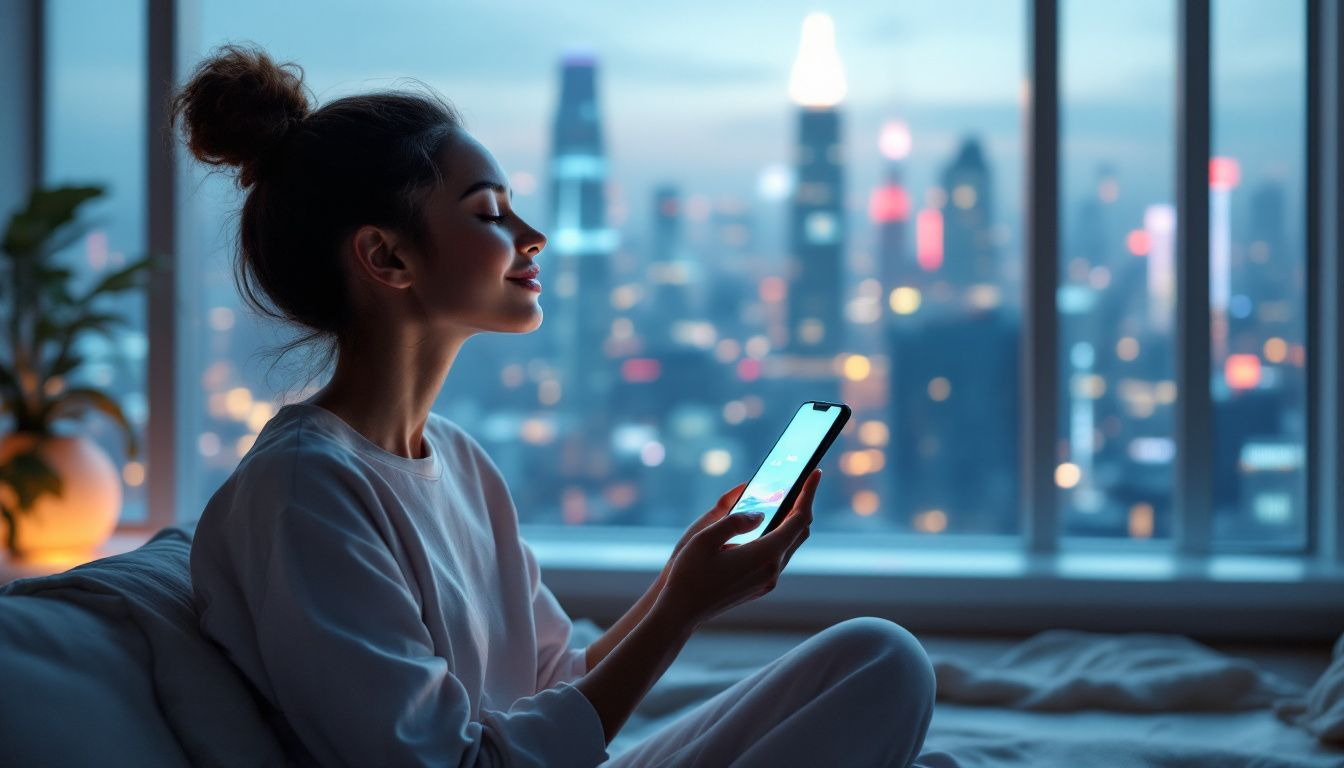Looking for the best AI Digital Detox Tools 2025? This article highlights top AI apps like screen time trackers, smart notification managers, and digital well-being assistants, helping you manage tech use and reduce stress effectively.
Key Takeaways
- Embrace AI-powered apps to monitor screen time and manage digital distractions for improved focus and well-being.
- Utilize smart notification management and personalized digital assistants to create a distraction-free environment and enhance mental clarity.
- Implement digital detox strategies, including unplugged weekends and tech-free zones, to foster deeper personal connections and improve work-life balance.
AI-Powered Apps for Mindful Tech Use

Navigating the hectic digital landscape, preserving concentration and being mindful can often seem overwhelming. AI-driven applications are crafted to establish an environment free of distractions so individuals can dedicate their attention to important tasks at hand. These technologies have the capability to scrutinize your patterns in task execution, pinpoint interruptions from the digital realm, and assist you in managing your online time effectively through tracking while fostering more beneficial usage behaviors. Introducing AI into our day-to-day lives has a substantial potential for boosting overall well-being by curtailing digital intrusions and nurturing conscious engagement with technology.
So how do these marvels manage such impressive feats? By utilizing sophisticated algorithms that keep tabs on our online interactions, these apps provide tailored insights designed to help users find equilibrium. Achieving this balance is essential for diminishing feelings of digital burnout and enhancing a positive relationship with technological devices.
To delve deeper into this subject matter, let’s explore specific examples of AI-infused applications that are pioneering efforts toward encouraging thoughtful interaction with technology.
AI-Driven Screen Time Trackers
Advancements in wearable technology have led to the development of features that assist individuals in tracking their screen time and prompting appropriate breaks. Utilizing AI, these tools deliver customized insights that enable users to pinpoint which apps or activities are most distracting, allowing for better control over screen usage. Picture having clear knowledge about which applications are leading you wrong and possessing the ability to manage them with ease.
These innovative applications can adaptively modify your device’s display settings — tweaking brightness and color warmth as the day progresses — thus decreasing blue light exposure at night and contributing positively to improved sleep patterns. Some cutting-edge AI software goes even further. By locking devices after extended periods of use, promoting essential breaks from digital engagement and curtailing overall time spent on screens.
Collectively, such functionalities aim at cultivating a healthier approach towards our digital practices by embracing balance and mindfulness.
Smart Notification Managers
To effectively limit digital interruptions, it’s critical to use the do-not-disturb feature on smartphones, which assists in establishing limits for technology usage. Yet, for a genuine reduction in digital distractions, one must disable notifications from disruptive applications such as social media platforms and games. By carefully selecting which alerts are permitted through this deliberate management of notifications, individuals can lessen disturbances and foster a serene atmosphere conducive to concentration.
Conscientious notification settings greatly enhance productivity by diminishing the onslaught of alerts that fracture attention. This approach is about shaping an electronic environment that honors your requirement for consistent periods of time free from interruption—be it for professional tasks, meditation practices or leisurely strolls.
Personalized Digital Well-Being Assistants
AI-powered tools for managing stress represent a transformative development, delivering prompt notifications regarding worrisome emotional patterns. These digital assistants, designed to promote personal well-being, furnish customized advice aimed at boosting mental clarity and emotional wellness. Visualize owning a digital ally that comprehends your feelings and recommends actions or intervals to preserve equilibrium.
With the ongoing advancement of AI innovations, these aides are set to grow more intricate in their capabilities, assisting individuals in better regulating their engagement with technology. This individualized strategy holds considerable potential for augmenting both emotional welfare and general health amid our progressively connected world.
Enhancing Focus with AI Tools

Technology can greatly diminish your concentration, and consequently, affect your productivity negatively. The use of AI tools can facilitate the development of deliberate technology-related habits that preserve focus and minimize interruptions. By choosing particular times to engage with connectivity and designating specific intervals for checking emails, you prevent disturbances from notifications, which paves the way for periods of intense work.
Establishing areas free from tech interference as well as planning breaks away from technology can vastly alleviate workplace stress and anxiety. Employing these strategies through AI not only elevates efficiency but also encourages stronger interpersonal relationships while enhancing mental clarity.
Let’s delve into some distinct AI instruments that are designed to boost focus.
AI-Based Focus Apps
AI-infused applications offer tailored recommendations and strategies to optimize screen time usage. By establishing daily restrictions on the use of digital devices, these apps promote efficient time management. Consequently, they aid in diminishing digital fatigue while enhancing overall productivity. Tracking screen time provides insights into which apps and websites consume the most time, enabling users to focus on decreasing their use where it’s most excessive.
Programs such as Freedom, Forest, and Cold Turkey are designed to eliminate distractions from certain websites and applications, thus substantially boosting one’s work efficiency. These tools have the potential to improve work performance by up to 40%, proving they are essential in an era dominated by technology.
Adaptive Work Timers
Timers that adjust adaptively are designed to optimize periods of work and rest, thus improving productivity. They tailor the timing of work sessions and breaks according to an individual’s unique patterns of productivity, making it possible to know precisely when a pause is needed for sustained concentration and refreshment during your day.
Timers powered by artificial intelligence (AI) observe user habits and identify optimal moments for both concentration and relaxation. Such tools play a crucial role in achieving a balanced life between professional duties and personal well-being in our current era, where we face relentless digital interruptions.
AI Solutions for Better Sleep Patterns

Controlling the amount of time spent on devices is essential for bettering sleep habits, since too much screen time can cause disruptions in sleeping patterns. AI technology has the potential to foster an ambiance conducive to improved sleep by managing device use and offering tailored advice. Imagine a device that instructs you precisely when to disconnect from your devices in order to achieve restful sleep.
Devices equipped with wearability features such as the Feel Monitor employ cutting-edge sensors paired with artificial intelligence to monitor aspects related to emotions, stress levels, and sleep on a continuous basis. These personalized suggestions help fine-tune one’s sleeping environment. Such AI-driven instruments play a significant role in elevating emotional well-being and are instrumental in enhancing overall quality of sleep.
AI Sleep Coaches
AI sleep coaches offer tailored assistance by recognizing individual disturbances in users’ sleep patterns and crafting specific strategies to tackle these issues. By examining sleep data, AI provides valuable insights that aid in the progressive enhancement of one’s sleep health. These virtual coaches typically apply cognitive behavioral methods to refine users’ sleeping habits.
By monitoring and analyzing the quality of rest, AI tools contribute significantly to the improvement of personal sleep patterns. They are essential resources for those striving to secure a peaceful night’s sleep, guiding them towards cultivating superior bedtime practices.
Blue Light Filter Apps
Incorporating blue light filter apps into your digital routine can enhance the quality of your sleep by diminishing eye strain and boosting the production of melatonin. By counteracting the negative impact that extended screen time before bed has on restful sleep, these applications ensure you experience more tranquil sleep.
AI-driven blue light filter applications tailor your device’s display settings to alleviate eye fatigue and promote better-quality sleep. Such tools are crucial for individuals aiming to harmonize their electronic usage with improved sleep patterns.
Leveraging AI for Digital Minimalism

Digital minimalism is about reducing digital usage to essentials, enhancing focus and mindfulness. AI can help organize digital spaces, manage notifications, and streamline experiences, reducing digital clutter and distractions. Imagine having a digital assistant that keeps your digital life tidy and stress-free.
Regular unsubscription efforts minimize digital clutter and prevent distractions. Informing others about your digital detox can avoid misunderstandings and ensure they know how to reach you in emergencies. These steps are crucial for a successful digital detox.
AI-Enabled Digital Declutter Tools
Technologies leveraging artificial intelligence can assist in file organization, notification management, and the simplification of digital interactions. Such tools are effective in diminishing digital clutter and subsequently creating a technology experience that is more concentrated and less fraught with stress.
Apps designed to limit access to distracting materials play a vital role in curtailing procrastination while significantly boosting productivity. These instruments are indispensable for individuals who aspire to embrace the concept of digital minimalism.
Automated Unsubscription Services
Tools that automate email subscription management effectively streamline the reduction of unnecessary digital messages. These resources are essential for keeping a digital life free from clutter and helping to concentrate on what’s genuinely important.
AI-Driven Emotional Well-Being Monitors
Emotional well-being is often overlooked in our quest for productivity. AI-driven emotional well-being monitors focus on enhancing emotional health by using advanced technology to track and analyze emotional states. Wearable devices can enhance emotional awareness by tracking physical and psychological metrics, providing a comprehensive picture of your emotional well-being.
As artificial intelligence continues to evolve, it will likely lead to innovative tools that monitor emotional well-being more effectively. These tools will play a crucial role in enhancing strategies for individual well-being and mental health.
Now, let’s dive into specific tools like mood tracking apps and stress management tools.
Mood Tracking Apps
AI assesses users’ emotional conditions by evaluating their input and behavioral trends. Apps designed for mood tracking provide personalized solutions following an analysis of the user’s emotions, recommending actions that can elevate one’s spirits. The incorporation of these applications into everyday life can profoundly bolster emotional well-being and fortify resistance to stress.
Utilizing AI-powered technology, mood-tracking apps assist individuals in comprehending and regulating their emotional health. These instruments are essential for sustaining a harmonious state of mind amidst the bustling pace of the digital world.
Stress Management Tools
AI tools dedicated to stress management can detect an individual’s stress levels and offer custom relaxation strategies. By offering insights into a person’s emotional condition, these tools are instrumental in controlling stress by alerting users when it’s time for a break and proposing the most suitable relaxation method.
Such AI tools are critical for promoting well-being as they adapt relaxation methods to suit personal requirements, aiding in the regulation of anxiety and depression. For those aiming to achieve a harmonious work-life balance and adeptly handle stress, these technologies are indispensable.
Integrating AI into Daily Routines for Better Work-Life Balance
Digital detox has been shown to improve mental clarity, focus, and work-life balance. Taking unplugged weekends enhances mental and emotional well-being, allowing deeper engagement with personal interests and relationships. Engaging in outdoor activities, hobbies, and quality time with family and friends can be fulfilling during a digital detox. Additionally, implementing digital detox techniques can further enhance these benefits.
The best time to start a digital detox is during peak work mode or high-pressure periods like exam weeks. Before starting a digital detox, consider potential consequences of missing important messages and plan accordingly.
Now, let’s explore AI-powered task managers and smart home devices for digital detox.
AI-Powered Task Managers
AI-managed task managers can help set healthy work boundaries, enhancing job satisfaction and performance. Implementing these boundaries leads to greater overall job satisfaction. Focus apps not only block distractions, but also provide insights into time management efficiency.
These insights can help individuals optimize their productivity while ensuring adequate breaks to prevent burnout. These tools are invaluable for maintaining a healthy work-life balance in a tech-driven world.
Smart Home Devices for Digital Detox
Intelligent home gadgets are instrumental in crafting areas without technology that promote a digital detox atmosphere. Employ devices designed to curtail screen time and stimulate engagement in non-digital pursuits, such as smart lighting systems which can be tailored for activities like reading or unwinding.
Incorporating both analog tools and intelligent home equipment into your everyday life can aid in fostering more wholesome habits away from screens. These technological devices are vital for individuals aiming to diminish their screen usage and establish an equilibrium within their digital existence.
The Future of AI in Digital Detox

Artificial intelligence holds immense potential to improve digital detox methods with tailored advice, as AI-driven apps are being designed to curtail screen time by tracking usage patterns and offering personalized insights for better digital habits. The advent of these emerging AI technologies is significantly transforming the way individuals approach digital detox, aiding them in more effectively regulating their technology use.
Nevertheless, employing artificial intelligence to assist in digital detoxification brings up serious concerns regarding privacy, data protection, and the independence of users. While these AI instruments can foster well-being by encouraging healthier technological practices, they simultaneously carry the threat of heightening surveillance and possibly influencing user actions.
Ensuring that the advantages offered by artificial intelligence go hand-in-hand with preserving personal freedom and overall well-being remains a pivotal issue amidst our technology-infused reality.
Emerging AI Technologies
Advancements in AI technology are revolutionizing the approach to digital detox by giving individuals better control over their engagement with technology. Applications enhanced by AI work to diminish screen time through careful observation of user behavior, providing valuable feedback that encourages more beneficial digital routines.
The capabilities of these advanced tools extend into improving concentration by smartly sifting and arranging alerts so users can decrease interruptions from their digital devices. Customized well-being assistants, powered by artificial intelligence, provide bespoke suggestions aimed at fostering mental sharpness and bolstering emotional health.
Ethical Considerations
Employing AI in the pursuit of a digital detox touches on critical ethical concerns regarding privacy, data protection, and the independence of users. Although AI instruments have the capacity to improve mental health by encouraging better technological practices, they carry with them the danger of heightened monitoring and possible influence over user actions.
Newly developed AI systems introduce additional ethical issues concerning their methods for collecting and using personal information pertinent to mental well-being. Striking an equilibrium between harnessing the advantages provided by AI and maintaining personal freedom and health within a technology-centric environment is vital.
Summary
In summation, incorporating AI into the process of digital detoxification presents a viable strategy for achieving equilibrium in our technology-laden lives. These AI-powered applications are intricately designed to aid us in moderating screen time, managing notifications, sharpening focus, improving sleep quality, and fostering emotional health—enabling us to prosper amidst an ever-connected society. By harnessing such tools effectively, we can reclaim dominion over our technological engagements and bolster overall well-being.
Looking ahead, it’s imperative that we strike a careful balance between the advantages offered by AI and considerations surrounding ethical practice—including privacy protection, data security safeguards, and preserving user independence. In doing so lies the opportunity to cultivate a more beneficial relationship with modern technology while reaping the rewards of embracing digital detox techniques. Are you prepared to embark on this journey toward balanced tech usage? Initiate your transformation now and witness firsthand how artificial intelligence can revolutionize your approach to digital detoxification.
Frequently Asked Questions
What are AI-powered apps for mindful tech use?
AI-powered apps for mindful tech use help you cultivate healthier digital habits by analyzing your work patterns and creating distraction-free environments.
Embrace these tools to boost your focus and well-being!
How do AI-driven screen time trackers help reduce screen time?
Tools powered by AI that track screen time can successfully decrease the duration spent on screens by providing customized observations and automatically securing devices after prolonged usage, encouraging you to take essential breaks.
Utilize these instruments to regain control over your schedule and boost your overall well-being!
What role do AI sleep coaches play in improving sleep patterns?
AI sleep coaches play a crucial role in improving sleep patterns by scrutinizing data to provide tailored insights, which aid individuals in cultivating better sleeping habits for enhanced quality of rest.
Embark on the path towards improved sleep!
How do AI-driven emotional well-being monitors enhance mental health?
AI-driven emotional well-being monitors enhance mental health by tracking your emotional and physical states, offering personalized insights and interventions to boost resilience and improve overall well-being.
Embrace these tools to take charge of your mental health journey!
What are the ethical considerations of using AI for digital detox?
Using AI for digital detox presents important ethical considerations, particularly concerning privacy and user autonomy.
It’s crucial to ensure that the technology supports user well-being without compromising personal freedoms or security.